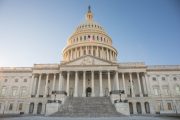
The legislation is miniscule compared to the Democrats original grandiose vision of a comprehensive climate change bill mandating emissions cuts, tough renewable energy standards, carbon trading and more. But without the necessary 60 votes for the broader proposals, Reid and fellow Democrats are hoping this smaller bill can make it through.
Among the provisions are about $5 billion in federal rebates for making homes more energy efficient, more than $5 billion to promote trucks that run on natural gas, and hundreds of millions to study electric cars (something the private sector was already doing quite well). Another important part of the legislation would raise the $75 million liability cap for oil companies.
“Many of us want to do a thorough, comprehensive bill that creates jobs, breaks our addiction to foreign oil and curbs pollution,” Reid told reporters last week. “Unfortunately, this time we don’t have a single Republican to work with in achieving this goal.”
The House of Representatives already passed its own energy bill last year, and it contains the cap-and-trade regime pushed by global-warming alarmists. But even though Reids new bill does not, analysts worry that if the Senate passes the proposed energy legislation, cap and trade will be added when the House and Senate bills are combined.
“Harry Reid has said he removed cap and trade from the energy bill. Do we believe Harry Reid?” asked Phil Kerpen, policy director of the non-profit group Americans for Prosperity.
“It’s not a big secret, they just think we’re not paying attention,” Kerpen said, referring to efforts to implement the carbon trading system by stealth. He also urged Republicans to vote against any energy bill, saying Democrats did not deserve the benefit of the doubt.
Other groups have also warned against celebrating the death of cap and trade just yet. “In a year when seemingly dead legislation has suddenly come back to life, it is premature for Americans to dance a victory dance that their economy has been spared,” wrote Audrey Jones with Heritage Foundation after Reids announcement. “Even small victories in Washington are followed closely by new battles.”
Some Senators have also confirmed that they intend to continue pushing the cap and trade regime, especially Democrat John Kerry. Reid said the Senate could take up the issue again in September. BP, Goldman Sachs, and other powerful corporations lobbying for the carbon-trading system are also not giving up hope. And President Obama has warned that the battle is not yet finished.
“You’ve got one bill that passes the House; you’ll have a different bill that passes the Senate,” explained White House spokesman Robert Gibbs. “And then there will be an opportunity to reconcile those two differing bills,” he added, saying he certainly wouldn’t rule out the possibility of a broader climate bill emerging from the reconciliation.
The new energy bill has also been criticized by Democrats and environmental special-interest groups who complain that their pet provisions were not included.
“It seems to me that [it] would be logical to include [renewable electricity standards] in the energy bill that was going to be brought to the floor,” said Democratic Senator Byron Dorgan of North Dakota, who hopes to force energy suppliers to produce at least 15 percent of their power from renewable sources. “I hope maybe there’s a way to be found to do that.”
Republicans and some Democrats, meanwhile, are criticizing the proposal to abolish or raise the oil-spill liability cap from the current $75 million, which could force BP to pay massive damages for the spill in the Gulf of Mexico. Opponents have said the move would cost jobs, but supporters say removing the unconstitutional cap on oil-spill liability is the only sensible, constitutional part of the new energy bill.
“This would cut domestic production, kill American jobs, slow economic growth and cost billions in federal oil and natural gas revenues,” said American Petroleum Institute President Jack Gerard.
But some Democrats were having none of it. “What they want is a law that basically continues to protect oil companies and their profits” said Senator Robert Menendez.
Purchasing insurance should be considered a regular business expense, argue opponents of the liability cap. If a project is too expensive to insure privately, it is probably too risky to be worth doing. Plus, politicians have no business putting an unlimited supply of tax dollars on the line to subsidize oil companies.
The GOP plans to offer an alternative energy bill, possibly as an amendment to Reids legislation. One key difference is the oil spill liability cap.
Republicans want taxpayers to foot the bill for BPs disaster and allow BP to use endless legal battles to run out the clock on those whose livelihoods they destroyed just like Exxon did to victims of the Valdez spill, Reid spokesman Jim Manley said, criticizing the Republican energy proposals.
A vote on the bill is anticipated before the end of next week, but it could be delayed until after the August recess, according to media reports. Both parties are blaming each other for the hold up.
Its now perfectly obvious that Democrats are doing their best to keep us from passing a serious energy bill before the August recess, said Senate Minority Leader Mitch McConnell. A spokesman for Senator Reid, by contrast, attacked Republicans for not being inclined to give us agreement to deal with anything.
Opponents of the legislation, which a brief glance at Article I, Section 8 of the U.S. Constitution would show is totally contrary to the Supreme Law of the Land, have said that the best thing that could happen would be for the bill to simply be stalled permanently. After all, every dollar spent on subsidies, rebates, hand outs and other programs will be one more dollar added to the rapidly ballooning deficit. But rectifying the previous unconstitutional liability caps and making companies liable for their mistakes could be a welcome development.

